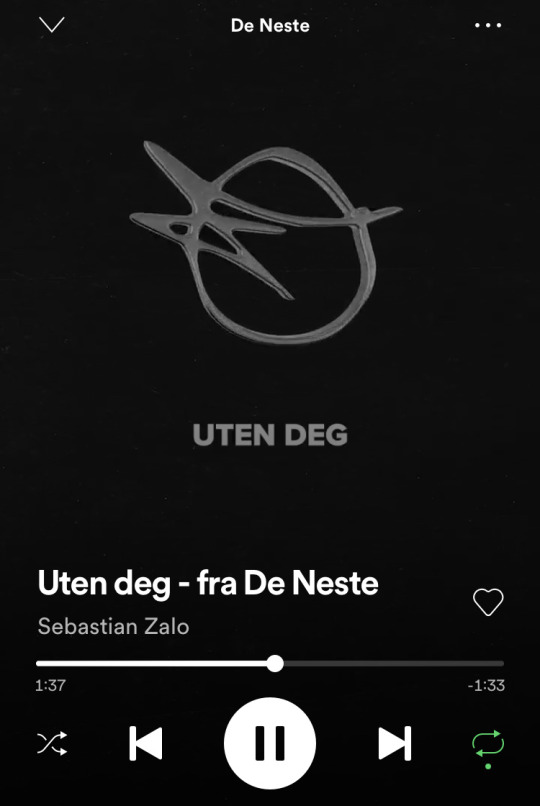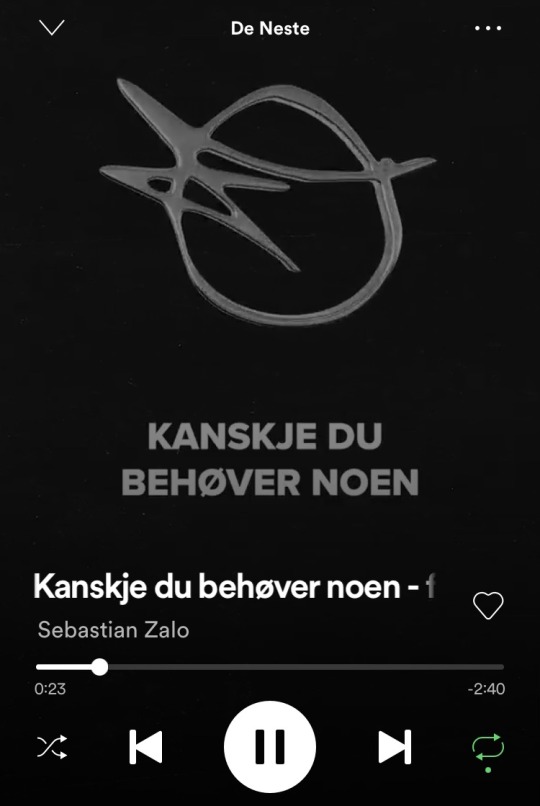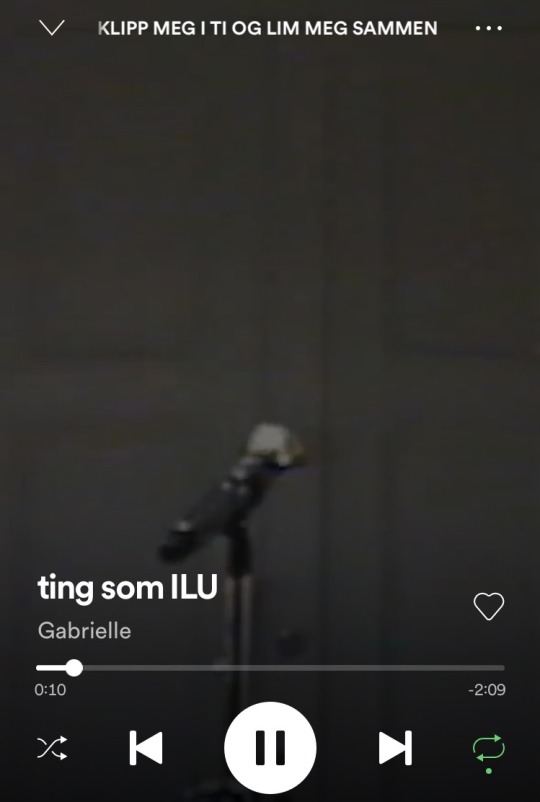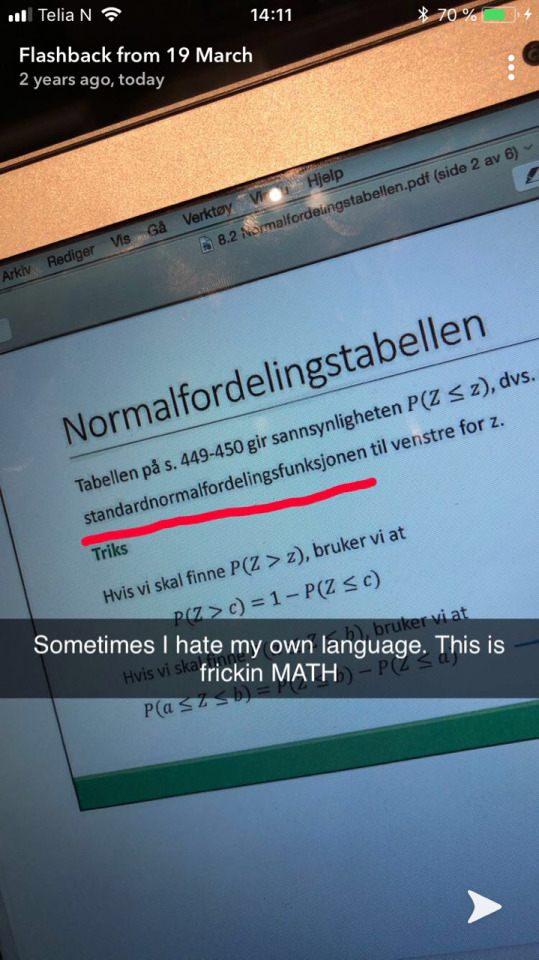Text

@archiveenthusiast That’s a very good question! You’re right about it being a dialect thing. “dey, mey” is the pronunciation used in the Oslo-area and Østlandet (the east) primarily. As you’ve probably noticed there’s not one correct way to speak Norwegian, but language apps/teachers often go for the Oslo-area pronunciation, even though it’s not really more “correct” than any other dialect (back in the day the Oslo West dialect was considered more “proper” but I wouldn’t say it is anymore)
Example of another variant right off the top of my head:
“dæ/mæ” - Nordland (i.e Lofoten)
#hope you don’t mind me answering like this#this is a side blog heh#Meg#deg#norwegian dialects#langblr#learning norwegian#norwegian#norwegian langblr#norsk#learning languages#learn norwegian#norge#norway#bergen
42 notes
·
View notes
Text
🇳🇴Norwegian music recs! 🇳🇴
By popular demand, I’m back with some more music recs! This time it’s up and coming
Sebastian Zalo


(«Without You» & «Maybe You Need Someone»)
These couple songs are covers of famous Norwegian songs, recorded for the NRK show De neste, where young singers who might end up as “the next” big artists showcase their talents - I highly recommend checking out all of the covers! (Just look up De neste on Spotify). And Sebastian Zalo is really about to be the next big star, I think.
He also has several very good original songs you should check out, for instance Babylon & Kjære frykten min («Dear My Fear»). He sings in an easily understood (if you’re learning bokmål) Eastern/Oslo dialect.
#Sebastian Zalo#learning norwegian#langblr#norwegian#norwegian langblr#norsk#learning languages#norwegian music#learn norwegian#norge#norway#music recs#norwegian music recommendations#Norwegian music recs#de neste
50 notes
·
View notes
Text
I can assure you it doesn’t have the same connotation but @deanu this is hilarious

(It’s more like “my woman” bc it’s said informally (e.g. dama mi))
🇳🇴 How slang makes Norwegian sentence structure even more important:
Type means “type” or “boyfriend”, depending on the context.
Han er ikke min type. - “He’s not my type.”
Han er ikke typen min! - “He’s not my boyfriend!”
However, you CAN for instance say “Hun er ikke min type” (She’s not my type) and “Hun er ikke typen min” and both sentences would mean the same thing (but the latter sentence sounds a little off).
Note: Boyfriend/girlfriend/romantic partner is gender neutral in Norwegian (kjæreste), but if you for whatever reason want to specify, you’d use slang. Type (literally “type”) for boyfriend and dame (literally “lady”) for girlfriend.
#thank you so much for this addition#I laughed#norwegian#norwegian langblr#learning norwegian#langblr#norsk#learning languages#learn norwegian#norge#norway#girlfriend#Norwegian girlfriend#kjæreste#Norwegian vocab
323 notes
·
View notes
Text
Hey Norwegian people!! Which meanings does the word ‘søke’ have? Duolingo says ‘to apply’ but other translation sites say ‘to look for’
#this is very common in Norwegian !#words do very often have several meanings#Norwegian#Norwegian langblr#learning norwegian#norsk#langblr
128 notes
·
View notes
Text
🇳🇴 How slang makes Norwegian sentence structure even more important:
Type means “type” or “boyfriend”, depending on the context.
Han er ikke min type. - “He’s not my type.”
Han er ikke typen min! - “He’s not my boyfriend!”
However, you CAN for instance say “Hun er ikke min type” (She’s not my type) and “Hun er ikke typen min” and both sentences would mean the same thing (but the latter sentence sounds a little off).
Note: Boyfriend/girlfriend/romantic partner is gender neutral in Norwegian (kjæreste), but if you for whatever reason want to specify, you’d use slang. Type (literally “type”) for boyfriend and dame (literally “lady”) for girlfriend.
#norwegian langblr#learning norwegian#langblr#norwegian#norsk#learning languages#learn norwegian#norge#norway#Norwegian sentence structure#kjæreste#Norwegian vocab#New Norwegian words#slang#Norwegian slang
323 notes
·
View notes
Note
hei! jeg lurte på om du hadde noen bok anbefalinger skrevet av norske forfattere? hvilke bøker tenker du er «klassikere» eller must-read innen norsk litteratur?
Hei! Beklager så mye for at dette svaret kommer flere måneder for sent. Håper du fortsatt kretser i nærheten og får med deg svaret likevel!
Jeg kunne listet opp mange norske såkalte “klassikere” ved navn, men jeg har faktisk ikke lest så mange av dem. De anbefalingene jeg gir her er 100% basert på de bøkene jeg selv har lest og likt, uavhengig av hva andre måtte synes om dem. Hvis du er vil ha flere anbefalinger fra den “litterære kanon” bør et enkelt Google-søk gjøre susen!
Når det er sagt - her er 15 norske bøker jeg virkelig anbefaler (romaner, skuespill, diktbøker, sakprosa… alt er med!):
Beatles - Lars Saabye Christensen
Eg er eg er eg er - Ruth Lillegraven
Eg snakkar om det heile tida - Camara Lundestad Joof
Et dukkehjem - Henrik Ibsen
Fra en annen virkelighet - Gunvor Hofmo
Jeg vil våkne til verden - Karoline Marie Brændjord
Mannen som elsket Yngve - Tore Renberg
Panserhjerte - Jo Nesbø
Parissyndromet - Heidi Furre
Rasismens poetikk - Guro Sibeko
Sofies verden - Jostein Gaarder
Syndere i sommersol - Sigurd Hoel
Søndag - Reidun Nortvedt
Tante Ulrikkes vei - Zeshan Shakar
Vi puster fortsatt - Yohan Shanmugaratnam
#camara lundestad joof#<3#norske bøker#book recommendations#Norwegian media recommendations#langblr#Norwegian langblr#learning norwegian
94 notes
·
View notes
Text
🇳🇴Hi there cool kids who are learning Norwegian!!🇳🇴
Just stopping by to let you know you should listen to Gabrielle’s new album klipp meg i ti og lim meg sammen (“cut me in ten (pieces) and glue me together”)


(“sunshine in a spotless mind” & “things like ilu“)
These two songs are my personal favourites but you should listen to the entire thing:)
She sings in the Bergen dialect, so it’s also a great way to get accustomed to the different ways of speaking Norwegian. Bergen is the second largest city so it’s pretty likely that you’ll bump into a bergenser if you visit Norway;)
#norwegian music recommendations#Gabrielle#klipp meg i ti og lim meg sammen#ting som ilu#solskinn i et plettfritt sinn#langblr#learning norwegian#norwegian#norwegian langblr#norsk#Norwegian music#musikk#learning languages#music recommendation#Norwegian dialects#dialekter
228 notes
·
View notes
Text
Throwback to this little gem of a word<333

255 notes
·
View notes
Text
Love it when I win at linguistic tic-tac-toe! Just texted
Er det det det heter? (“Is that what it’s called?”)
and had to reread it three times to make sure it was, in fact, a legitimate sentence. It is<3
#three in a row#:)#Norwegian#norsk#langblr#Norwegian langblr#linguistic tic tac toe#🇳🇴#learning Norwegian#weird sentences#learning languages#lær norsk#learn Norwegian#native norwegian
181 notes
·
View notes
Text
Filler words in Norwegian
Can’t learn a language without fillers!
altså - “well…” or “so…”
It’s often used to enhance confidence, whether it’s strong or weak.
Altså, mamma sa at jeg får lov til å gjøre det.. / Well, mum said I’m allowed to do it..
vel - “well”, can be used in the same way as in English. You can also combine it with altså:
Vel, altså, her er planen… / Well, so, here is the plan…
liksom - the Norwegian equivalent to “like” - use it everywhere! It can also be used to enhance sarcasm.
Har du liksom tenkt å gå med det der? / Are you seriously like, going to wear that thing?
da - this literally means then, but we often use it to end sentences, especially if we’re saying something that another person might want to argue with. And since it means ‘then’, you can also use it in the same way as in English.
Jeg skulle jo liksom bare prøve den på, da. / I was just going to like, try it on.
ehh / øhh - uhh, uhm. Super useful.
på en måte - “in a way” or “kind of”.
Han er litt merkelig, på en måte. / He’s a little strange, kind of.
bare - “just”
Jeg skal bare innom butikken. / I’m just gonna pop by the store.
ikke sant? - translates to “not true”, but is used for saying “right?” “don’t you agree?”.
Around Bergen, people usually drop the “ikke” and just say “sant”. I’m from Bergen so I didn’t know that not everyone says this until I googled it lol.
skjønner du / skjø’ - used at the end of sentences in the same way as “you see” in English. It comes from the word “å skjønne”, which means to understand, to realize or to “get it”. “Skjø’” is not really used in the southern regions, but if you’re around Trøndelag, you’ll hear this a lot. In other regions one would say “skjønner du”.
Han er lærer, skjø’/skjønner du. / He is a teacher, you see.
Feel free to ask me questions about these or request more specific fillers!
3K notes
·
View notes
Text
me: *looking at children’s books in the language im studying*
me: *understands 3 words in a single sentence*
me: I CAN READ!!!!!!!!!!
25K notes
·
View notes
Text
Norwegian Musicians Singing in Norwegian
🇳🇴 Part 1/? - Maria Mena

Maria Mena gets the number one slot, despite singing primarily in English, because she has the most beautiful voice in the kingdom of Norway. No discussion. It is even better live than in recordings, if you can believe it.
She recently released her first original Norwegian song, Speil (Mirror), and I also highly recommend checking out her covers from “Hver gang vi møtes” (a TV-show in which famous musicians cover each other’s songs - they’re all on Spotify). Her vocals on Karpe’s song Påfugl are heart-wrenchingly beautiful. You might cry without even understanding the words. Now, you have been warned.
(And her English discography is obviously also great. I especially like the albums Growing Pains and Viktoria).
#norwegian musicians singing in norwegian#maria mena#norwegian#norway#langblr#norwegian music#norwegian musicians#norwegian singers#not ok#music#norwegian langblr#learn norwegian#learning norwegian
21 notes
·
View notes
Text
Something that really frustrates me is that saft is a word in both German and Norwegian but they are not the same thing
#isn’t this what the call false friends?#German#learning German#learning norwegian#false friends#langblr#german langblr#Norwegian langblr#Norwegian#Norway#Germany#saft
7 notes
·
View notes
Text
Norwegian Words & Context
🇳🇴 Part 1/?
Bønner is the indefinite plural of both bean and prayer. This made for a quite the interesting misunderstanding in religion class back when I was in the second grade...but I might tell that story later.
Examples:
“Jeg er ikke så glad i bønner.” (”I don’t like beans that much”).
“Jeg er ateist, så jeg ber ikke bønner.” (”I’m an atheist, so I don’t pray prayers.”)
Also... not to be confused with “bønder” (farmers) which is pronounced almost the same way:))
#the prayer sentence is a little unnatural but oh well#bønner#norwegian langblr#langblr#norwegian#norsk#learning norwegian#norwegian words & context#norwegian words#new words#learning languages
13 notes
·
View notes
Text
Norwegian Words & Phrases You (Probably) Won’t Learn in School
🇳🇴Part 1/? - Banneord (Curse words)
Norway is really into banneord that has some connection to the devil.
First out we’ve got faen, derived from “Fanden”(”The Devil”). It’s probably the most versatile Norwegian curse word of them all. You can use it for basically anything. It is largely used to the same extent as “fuck” in English (even though we also use “fakk” or “fuck”).
Examples:
Faen ta deg - Lit. May the devil take you. Fig. Fuck you
Men for faen! - But for fuck’s sake!
En stakkars faen - A poor devil (poor as in miserable. But you can substitute the adjective for any word, really. I.e. “Din heldige faen” (”You lucky bastard”).
Faen! - Fuck! Used when you stub your toe, you drop something to the ground, you lose a game, etc. etc.
Check out bokmålsordboka for more ways to use faen (there’s a lot).
#banneord#faen#norwegian words and phrases you probably won't learn in school#langblr#norwegian langblr#norwegian#learning norwegian#learn norwegian#norsk#learning language#curse words#lær norsk
93 notes
·
View notes
Text
It’s the same in Norwegian! Except both things are called the exact same word (Drage)
Something cool I found out today:
“Drache” is German for “dragon” and “Drachen” means “kite”. Does that mean kites are dragons?
15K notes
·
View notes
Link
Min personlige favoritt er «trusebluse» (istedenfor body)
Ei nyttig ordforrådsliste for dere som lærer norsk! Selv om mange engelske ord kan brukes når man snakker norsk, synes jeg det er fint å bruke norske ord når det er mulig.
26 notes
·
View notes